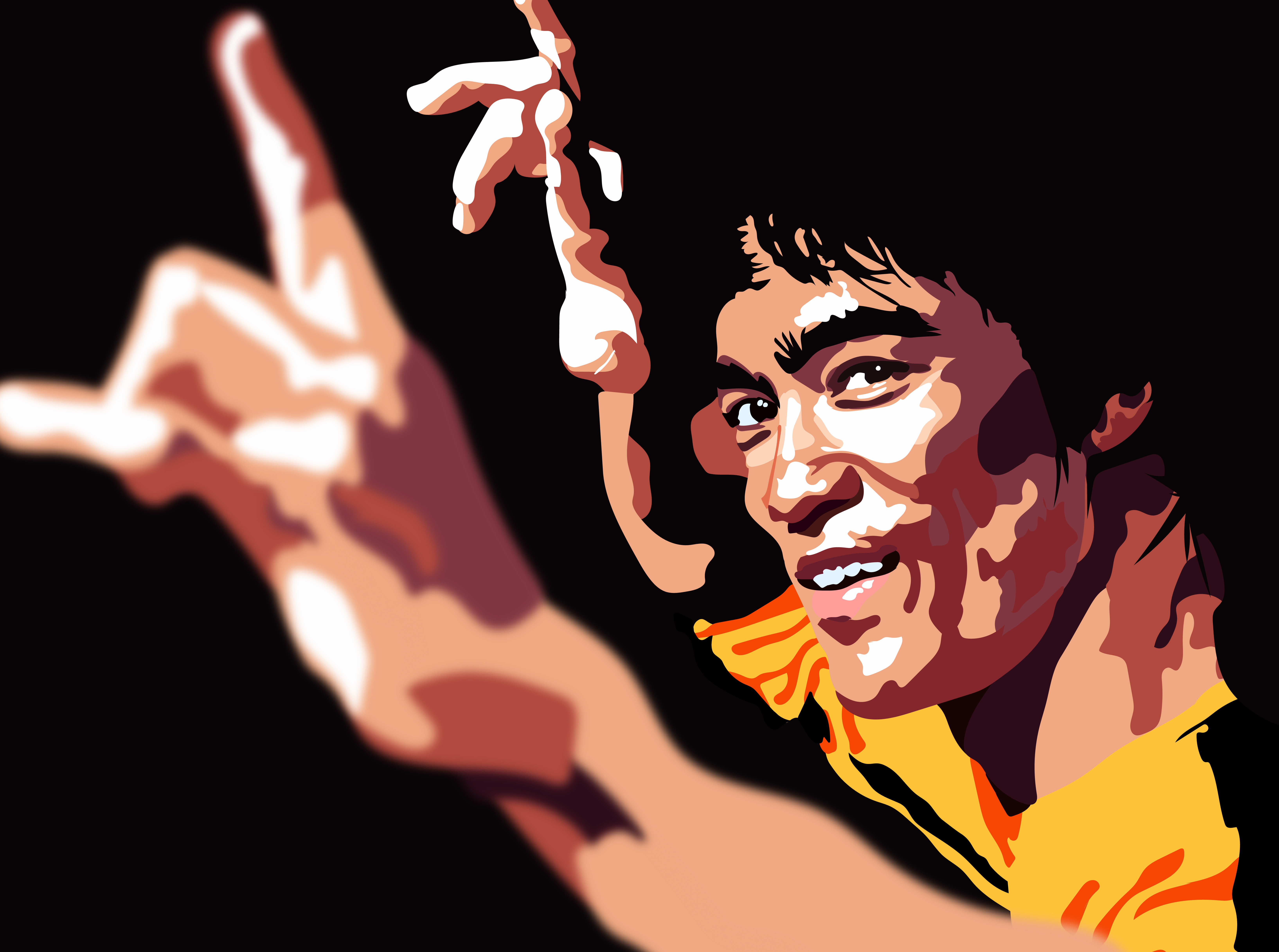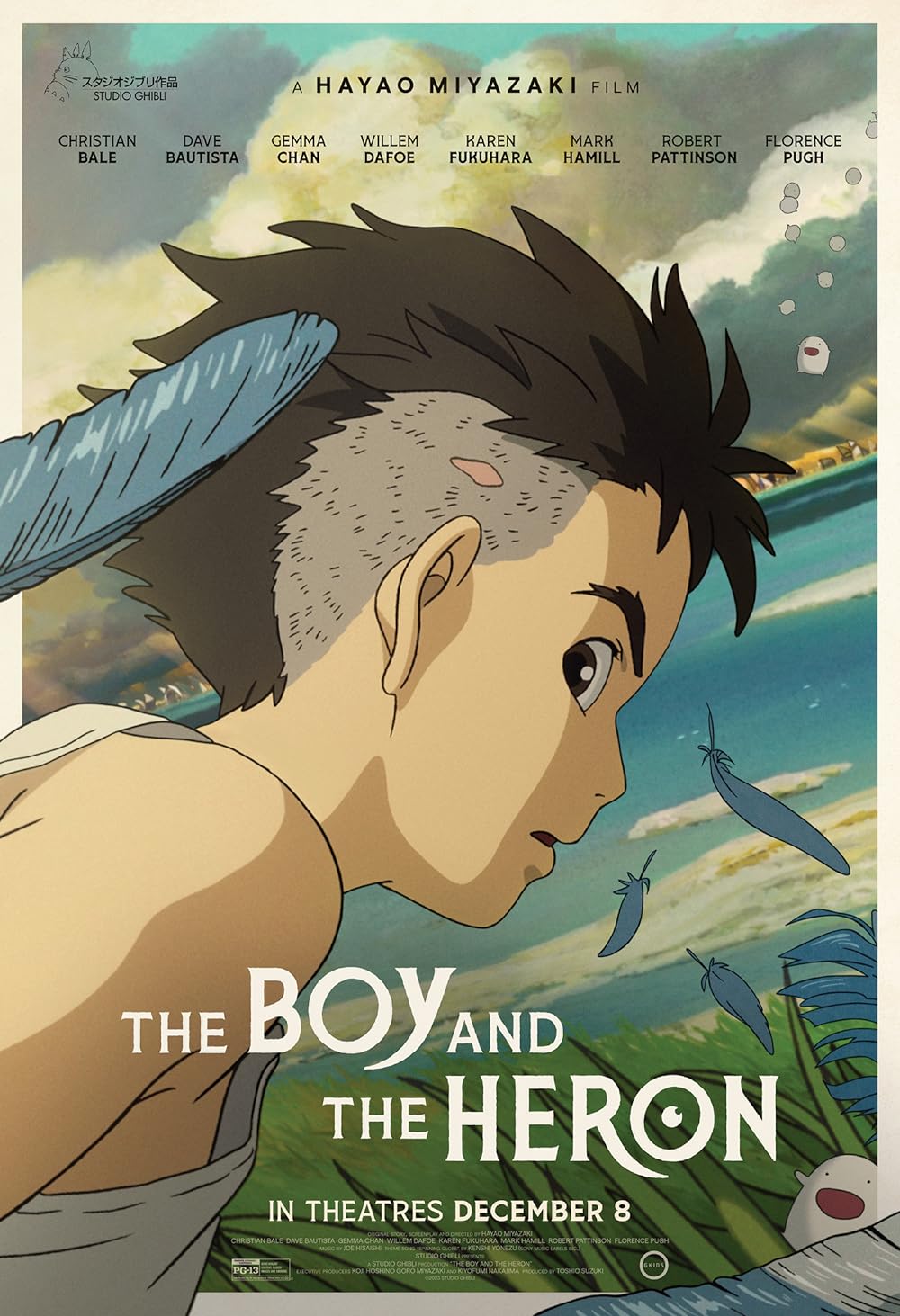| RELEASE DATE | RUNTIME | IMDB | ROTTENTOMATOES | METACRITIC |
|---|---|---|---|---|
| Dec 8th, 2023 | 2hr 4m | 7.6 | 97% | 92 |
Premise:
A young boy named Mahito yearning for his mother ventures into a world shared by the living and the dead. There, death comes to an end, and life finds a new beginning. A semi-autobiographical fantasy from the mind of Hayao Miyazaki.
Director(s):
Hayao Miyazaki
Writer(s):
Hayao Miyazaki
| JAPANESE VOICE CAST | ENGLISH VOICE CAST | |||
|---|---|---|---|---|
| Soma Santoki | … | Luca Padovan | … | Mahito Maki (voice) |
| Masaki Suda | … | Robert Pattinson | … | The Grey Heron (voice) |
| Takuya Kimura | … | Christian Bale | … | Shoichi Maki (voice) |
| Aimyon | … | Karen Fukuhara (as Lady Himi) | … | Himi (voice) |
| Kô Shibasaki | … | Florence Pugh | … | Kiriko (voice) |
| Yoshino Kimura | … | Gemma Chan | … | Natsuko (voice) |
| Shohei Hino | … | Mark Hamill (as Granduncle) | … | Great-Uncle (voice) |
| Jun Kunimura | … | Dave Bautista | … | The Parakeet King (voice) |
| Kaoru Kobayashi | … | Willem Dafoe (as Noble Pelican) | … | Old Pelican (voice) |



From a visual perspective it was great but It kind of went over the head from a story perspective. Based on the reactions from the theater at the end everyone there felt the same. Someone help me please.
spoiler
Spoilers: Like what was the reason his aunt was in the chamber? Why did the heron make a fake version of his mom? What was the parakeets deal with capturing Hime just to drop her off and not make any demands. If his uncle wanted him there why were the sentient things so hostile toward him? What was the deal with the baby souls if this whole place was fiction?
I found this Reddit comment that I think explains the movie pretty well. I agree it can go over your head easy but this makes the most sense to me and is closest to how I felt about it.
https://www.reddit.com/r/movies/comments/189iju6/the_boy_and_the_heron_is_beautiful_and/kbtzvns/
spoiler
The film is not about Mahito’s “quest” to find Natsuko. It’s about his “quest” to overcome his grief / anger / bitterness and persevere in an unjust and cruel world, and his ability to find Natsuko and accept her as his new mother is just one aspect of that.
I don’t agree that the last half of the movie is vague at all. The general thematic thrust is very clear: “I am dying soon and the fabric of my reality is coming apart; you can follow in my footsteps and try to control everything until the bitter end, or accept that life is chaos and you can only control some things so try to enjoy what you can.” The main themes are death and rebirth. Mahito, in meeting a younger version of his mother (Himi), finally gets closure about her death (“I’m not afraid of fire”), even as she passes him onto her sister Natsuko, who is both Mahito’s “new mother” and also literally pregnant with a new child.
The plot is pretty simple and makes sense when you don’t overthink it. My take is that if you see it again, knowing how the film is structured, it will be easier for you to understand.
Natsuko is called to the tower because she is part of the uncle’s bloodline. (Kiriko mentions “We maidens can’t hear the tower master’s voice.”) The tower master intends to keep the baby as his successor. Himi makes it clear that the Tower Master expects to keep Natsuko and her child there forever, and initially suggests Mahito give up and go home. So the stakes for Mahito are that he loses his “mother”/family AGAIN. The “taboo” of entering the birth room is probably a part of the religious beliefs of the parakeets relative to their “Lord”/God, who is the Tower Master, but it has echoes of the Japanese myth of Toyotama-hime , who turned into a dragon while giving birth and devoured her husband for breaking the taboo – the papers in this film, with their sharp teeth, resemble a dragon as well. She says she hates him because she and the chamber are in the clear possession of the meteor, which understands that that is one of the worst things she could say to him (whenever you see the electric sparks, that is a sign that the meteor is reacting). Natsuko escapes at the end of the film because the stone implodes and no longer has control over her.
Mahito does reflect on this choice between his two encounters with his granduncle. In his first encounter he derides the stone blocks as being “full of malice” since they are tombstones. He awakens from his slumber and witnesses the lengths to which the parakeets will go to confront their “Lord.” Then on his second encounter, he realizes it’s actually himself that is “full of malice” (signified by his self-inflicted wound) and that he isn’t worthy of becoming a God. It seems you missed the idea that the tower master, via the meteor’s power, has control of space and time – the tower master is responsible for the suffering of the pelicans, the wara wara, the parakeets, etc etc. It is a “perfectly balanced” world by his standards, and he offers Mahito a chance to “build his own tower” and create a world of beauty and harmony. He says this very explicitly.
This is a matter of taste but I don’t know why you would look for that sort of melodrama from a Miyazaki film. When Chihiro is reunited with her parents in Spirited Away, they don’t hug and cry and get emotional. In The Wind Rises, Jiro is so disaffected, he can barely communicate his love for his wife even as she withers away in front of him. Miyazaki is about conjuring genuinely intimate moments between human characters with all their fears and faults, and I would argue that the low-key tea and jam Mahito shares with Himi is 100% more beautiful and emotional than “a tearful reunion” would have been, given that Mahito is so emotionally damaged. It seems clear to me that he recognizes she’s his mother on a fundamental level as soon as he eats her bread, which “is just like my mother used to make” (which is also after she tells him that Natsuko is her sister). We as the audience basically know Himi is his mother the first time we see her. So why would Miyazaki feel the need to include some sort of “reveal” scene? It’s not a Hollywood film. He respects our intelligence as viewers too much to do that.
Most of Miyazaki’s films are filled with “unexplained” magic, logical leaps, etc. This one is just ingeniously designed to keep you asking questions – which is why the original title is “How Do You Live?”
EDIT: Copy/pasted comment in case you don’t want to go to reddit.
It did explain one bit which I knew had to be some Japanese folklore I didn’t know. The rest I dk. I agree the overall plot is simple, it’s just the details I do not understand and felt there must be more back story from folklore or something which took away from the experience. Other Gibli movies like ponyo or howls moving castle didn’t leave me as confused on why they chose to show the audience something.